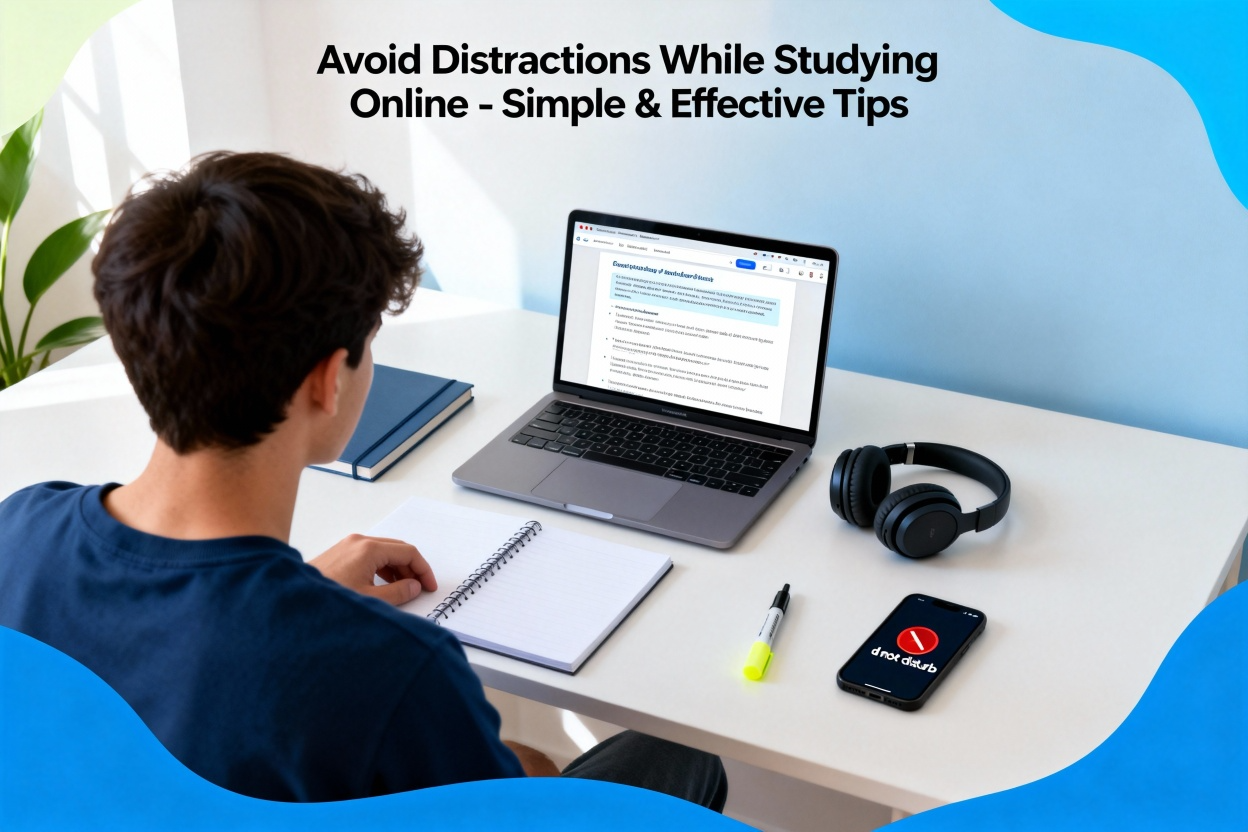Avoid Distractions While Studying Online – Simple & Effective Tips
Online learning has become a daily routine for students, but many still struggle to avoid distractions such as notifications, noise, chatting and multitasking. These interruptions can break focus and make studying less effective. Since students rely on digital classes, notes and videos, learning how to avoid distractions is now one of the most important skills for successful online study.
Notifications, chats, reels, background noise, multitasking and even boredom can easily break your concentration. Many students start their study session with full motivation but get distracted within a few minutes. If you want to study smoothly and avoid distractions, you need simple habits that support focus and consistency.
In this detailed guide, you will learn practical ways to build strong concentration, maintain discipline during online classes and make the most out of your daily study routine.
Why Do Students Get Distracted Online?
Before you learn how to avoid distractions, it’s important to understand why they happen. Online study environments are convenient, but they also keep you connected to everything that distracts you.
Here are the main reasons students lose focus:
-
Mobile notifications from WhatsApp, Instagram and YouTube
-
Social media addiction, especially reels
-
Background noise at home
-
Multitasking during classes
-
Improper study environment
-
Too many tabs or apps open at once
-
Lack of a fixed routine
-
Boredom caused by long study hours
The good news is that every distraction can be controlled with the right approach.
Create a Clean Study Space
The place where you study influences how focused you feel. A messy or noisy environment pulls your attention away from learning. A clean and simple study area prepares your mind to concentrate.
Tips to set up a distraction-free study space:
-
Use a table and chair instead of studying on the bed.
-
Keep your desk organised with only the essentials.
-
Remove unnecessary items like snacks, toys or unrelated books.
-
Choose a well-lit place with good airflow.
-
Avoid studying in crowded or noisy areas of your home.
This physical setup signals your brain: “It’s time to study.”
Turn Off Notifications Before Studying
One notification can break your focus for several minutes. Even “just checking” a message can make you lose track of the class.
Before starting your study session:
-
Turn on Do Not Disturb mode.
-
Turn off notifications for WhatsApp, Instagram, Snapchat and YouTube.
-
Use focus apps to block social media temporarily.
Recommended apps:
-
Focus To-Do
-
Study Bunny
Follow a Daily Study Routine
A routine trains your brain to focus at specific times. When you follow a timetable, your mind becomes disciplined and less likely to wander.
Simple example routine:
-
4 pm – 6 pm: Online classes
-
7 pm – 8 pm: Homework or practice
-
9 pm – 9:40 pm: Revision session
-
10 pm: Relax and sleep early
You can adjust this based on your school timings. What matters is consistency.
Use the 40–10 Method (Focus Cycle)
Studying for long hours without breaks leads to mental fatigue and boredom. The 40–10 focus method helps you stay sharp and productive:
-
Study for 40 minutes with full concentration
-
Take a 10-minute break
During the 40 minutes:
-
Don’t touch your phone
-
Don’t switch tabs
-
Don’t chat with anyone
During the 10-minute break:
-
Drink water
-
Walk around
-
Stretch
-
Avoid checking social media
Repeating this cycle improves retention and helps you avoid distractions for longer periods.
Organise Your Study Materials
Frequent interruptions like searching for a pen, a charger or a notebook can break your concentration.
Before you begin studying, keep ready:
-
Notebook
-
Pens/highlighters
-
Laptop/phone charger
-
Textbooks
-
PDF notes
-
Water bottle
A well-organised setup allows you to study smoothly without unnecessary breaks.
Avoid Multitasking
Many students try to attend class, chat with friends and check reels at the same time. Multitasking may feel productive, but it actually reduces understanding and memory power.
To maintain focus:
-
Keep only 2–3 tabs open
-
Close all unnecessary apps
-
Avoid jumping between tasks
-
Finish one topic before starting another
A single-task approach is the most effective way to avoid distractions.
Use Headphones During Online Classes
Headphones help block background noise and make it easier to follow classes. If there are younger siblings, TV sounds or conversations in the background, headphones can make a huge difference.
Benefits of using headphones:
-
Better concentration
-
Clearer audio
-
Less environmental noise
-
More immersive learning
This simple tool creates a more focused learning space.
Use Digital Tools Smartly
Online learning provides unlimited content, but too many tools can overwhelm students. Stick to platforms that offer structured learning.
Shiksha Nation, for example, provides:
-
Clear video lessons
-
Well-organised PDF notes
-
Easy dashboards
-
Worksheets and practice tests
-
Recorded classes
This structure helps you avoid distractions caused by switching between different apps.
Reduce Social Media Usage During Study Hours
Social media is the biggest reason students get distracted. You may open Instagram for one minute but end up scrolling for 15 minutes.
Solutions:
-
Log out of accounts before studying
-
Uninstall unnecessary apps during exam season
-
Keep your phone out of reach
-
Use app timers to control usage
Even reducing social media by 50% will dramatically improve your focus.
Ask Family Members for Support
Your home environment affects your concentration. Let your family know your study schedule so they can avoid making noise or calling you during that time. Parents can also help younger students stay disciplined and distraction-free.
Create Clear Study Goals
Goals give direction to your mind. When your study session has a purpose, it’s easier to avoid distractions.
Useful goals:
-
Complete two chapters today
-
Finish 40 MCQs
-
Revise one topic
-
Watch one recorded lecture
With clear goals, your brain stays focused.
Reward Yourself to Stay Motivated
Rewards keep your mind positive and motivated. After completing a study session, allow yourself:
-
A short break
-
A favourite snack
-
10 minutes of music
-
Watching a small video
Rewards help build stronger study habits and reduce distractions over time.
Build the Habit of Deep Focus
Avoiding distractions is not a one-day practice—it’s a habit. The more you train your brain to stay focused, the stronger your concentration becomes. Start with small changes and gradually improve your habits. Over time, you will see a big difference in your study performance.
Conclusion
Online study becomes powerful when you learn how to avoid distractions. A clean study environment, limited notifications, a daily routine, the 40–10 method, and organised study materials can completely transform your learning experience. Avoid multitasking, use headphones, rely on structured platforms like Shiksha Nation, and reward yourself for staying consistent. With these strategies, you will study smarter, stay focused for longer and perform better in exams.



